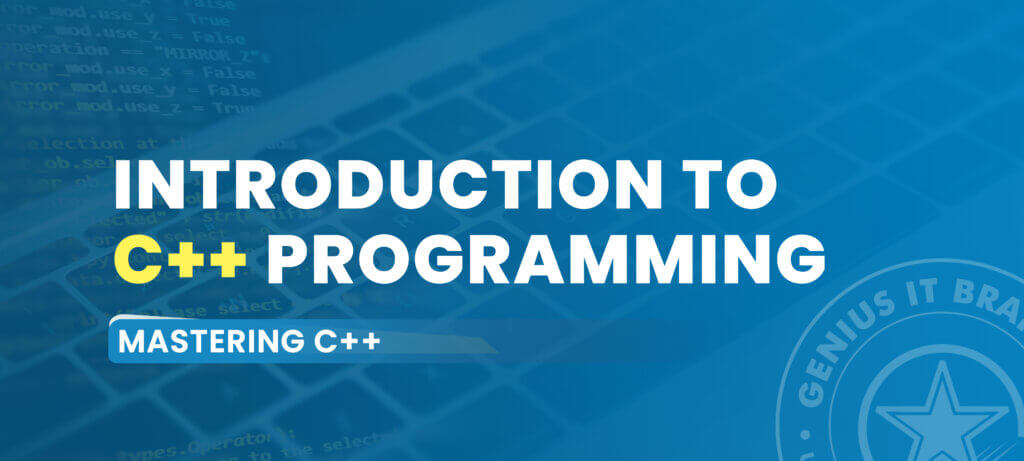This C++ Programming course provides a solid foundation in C++ for students and enthusiasts. Learners will explore core programming concepts, control structures, functions, arrays, and object-oriented programming. Through practical projects, participants will gain the skills to build efficient, interactive, and well-structured C++ applications for academic or personal use.

INTRODUCTION TO C++ PROGRAMMING
UNDERSTANDING PROGRAMMING WITH C++
DURATION
1 Month
REGISTRATION FEE
Ghc 150.00
TUITION FEE
Ghc 600.00
SCHOLARSHIP
N/A
Course Overview
Learning Objectives
- Understand the Fundamentals of C++ Programming
- Identify the purpose and applications of C++
- Describe areas where C++ is commonly used (e.g., systems programming, game development)
- Set up a C++ development environment
- Install and configure tools like Code::Blocks or Visual Studio
- Write and execute a basic C++ program
- Use main() function and include directives
- Use basic input/output operations
- Use cin for input and cout for output
- Work with data types and variables
- Declare and use int, float, char, bool, and string
- Understand constants and perform type conversions
- Apply Program Control Structures
- Implement conditional logic using if-else and switch statements
- Create branching logic based on user input or conditions
- Use loops for repeated execution of code
- Write for, while, and do-while loops
- Understand the role of break and continue
- Nest control structures effectively
- Build logic involving loops within conditionals and vice versa
- Develop simple interactive applications
- Create a menu-based program or quiz using learned control structures
- Utilize Functions and Arrays for Structured Programming
- Define and call custom functions
- Use parameters and return values
- Understand function prototypes
- Distinguish between local and global variable scopes
- Identify where variables are accessible within a program
- Work with one-dimensional arrays
- Declare, initialize, and manipulate arrays
- Perform common operations on arrays
- Traverse, sum elements, find averages, and search for values
- Design modular programs
- Break large tasks into smaller reusable functions
- Implement Object-Oriented Programming Concepts in C++
- Understand core OOP principles
- Encapsulation, abstraction, inheritance, and polymorphism (basic introduction)
- Define and use classes and objects
- Create class blueprints and instantiate objects
- Use constructors and destructors
- Initialise and clean up object resources
- Apply access specifiers to manage data access
- Use public, private, and protected keywords effectively
- Develop basic inheritance structures
- Create base and derived classes
- Build a real-world inspired project using OOP
- Apply OOP design in a school or banking system project
LEARNING OUTCOMES
Target Audience FOR
INTRODUCTION TO C++ PROGRAMMING Course
- Computer Science and Computer Engineering Students
Individuals pursuing academic degrees who need a strong foundation in programming with C++. - Beginner Programmers
Anyone new to programming who wants to learn a structured, widely-used language from the ground up. - Aspiring Software Developers
Learners aiming to build careers in software development and want to understand core programming and object-oriented principles. - Tech Enthusiasts and Hobbyists
Self-learners and tinkerers interested in building software or understanding how applications work under the hood. - STEM Educators and Trainers
Instructors seeking to upgrade their knowledge or teach foundational programming using C++. - Professionals Transitioning into Tech
People from non-tech backgrounds who want to gain programming skills for career switching or personal development.
Job Prospects for
INTRODUCTION TO C++ PROGRAMMING Course
Completing this course can open up entry-level and foundational roles in various areas of software and systems development. Possible job prospects include:
- Junior C++ Developer
- Assist in writing, testing, and maintaining C++ applications
- Support software development teams on larger projects
- Software Developer Intern / Trainee
- Gain practical experience in software projects
- Participate in bug fixing, code reviews, and documentation
- Embedded Systems Developer (Entry-Level)
- Work with hardware-level programming for devices
- Develop firmware using C/C++ for microcontrollers
- Game Development Assistant
- Support the development of game features or mechanics using C++
- Work with game engines that rely on C++ (e.g., Unreal Engine)
- Systems Programmer Assistant
- Contribute to building or maintaining system-level software
- Learn to handle performance-critical or low-level computing tasks
- Technical Support or IT Assistant
- Use programming knowledge to support automated tasks or scripts
- Troubleshoot software-related issues
- Freelance or Independent Developer
- Build and sell small applications or tools
- Offer services for automation or utility scripts.
This course also provides a solid foundation for further specialisation in fields like software engineering, robotics, AI development, financial systems, or cybersecurity, where C++ is commonly used.





